Editor’s Note: This is an edited transcript of remarks prepared and delivered at Stanford University’s Center for Law and History on January 12, 2008.
Lawrence Friedman: Good afternoon. As you know from your program, this is obviously going to be the deepest and most philosophical of the sessions, “Wordsmith, Theoretician, Mensch.” So my task is simply to introduce people and to moderate a little, but I want to tell a story. So I’m not supposed to be on this panel, just moderating it, but I can’t resist a story about Robert W. Gordon. [audience laughter] So, like an experience which I’m sure many people here have had is you submit something to be published, and it’s sent out to anonymous reviewers who make comments. I’ll bet Bob has forgotten this. So this was whatever—I’ve also forgotten what it was, but anyway, what I remember was that I got back this reviewer’s comment, and it was strikingly different from any other that I’ve ever gotten, both in style and in substance. The style was sweet. [audience laughter] It was gentle. It said things like, “Oh, this is wonderful, but—.” [audience laughter] And then the substance, after being extremely nice and continued to be extremely nice, it went on and on, with incredible erudition, “The author might want to include—,” this and that, and it was incredible.
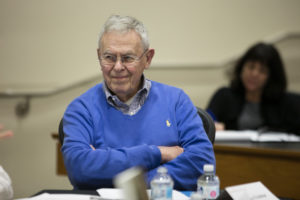
And I said to my wife, “There’s only one person in the country, in the galaxy, who could have written this. It’s Robert W. Gordon.” [audience laughter] And indeed it was. Now, we weren’t colleagues at the time. It was during his diaspora years. [audience laughter] But it was really wonderful. It was a combination of mensch-ness and incredible erudition that everybody here has recognized. So I just felt I had to tell that story, which I’m sure you’ve forgotten about, right, because you must have done that for a hundred people. Okay.
So we have a very distinguished panel here, and I was asked to gather their bios, but if I read them all, it would take up the whole time. Just let us suffice it to say that each one of them is more distinguished than the next one. [audience laughter]
Unidentified: The last one’s the oldest.
Lawrence Friedman: But then it can go around in a circle. [audience laughter] And we’re going to start with my colleague Barbara Fried, who kind of matches, I think, Bob, sort of, in erudition and is an expert on legal philosophy and tax law—or wait a minute. Okay. But anyway. [audience laughter] Okay, enough said. Barbara.
Barbara Fried: Enough said. More than enough. [audience laughter]
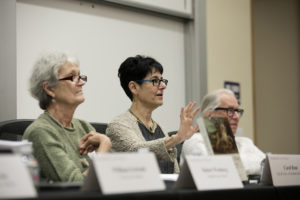
So I was given the assignment to talk about Bob as mensch, and I know you’re all thinking, “Oh, god,” like that is the fattest, slowest pitch over the plate anybody has ever been lobbed, and I agree with that, and everybody has already said most of the things I’m going to say on the subject, but I just want to say I think the other two topics which I was not asked to speak to, Bob as wordsmith and Bob as theoretician, are also slow, fat pitches over the plate, and I’ll leave it for other people to whack them out of the park. That’s the only sports metaphor I have ever used in my life. [audience laughter]
Okay. So, picking up on what Amalia said in her opening remarks and many people in the first panel said, I want to just briefly touch on two things, and the first has to do with Bob’s—I don’t know what the right word is—self-effacement, egolessness. So, many people have already commented on the fact that he knows everything. As Jed put it on the last panel, he is a human Google, and that aspect of Bob I have to say is both awe-inspiring and really annoying. [audience laughter] Like, what’s the man’s secret? Does he ever sleep? What’s going on here? I don’t know the answer to this, but I’ll just give you one piece of datum, which is for the first decade I was at Stanford, I was very fortunate to have an office right next to Bob’s, and Bob is—
[the recording was briefly interrupted]
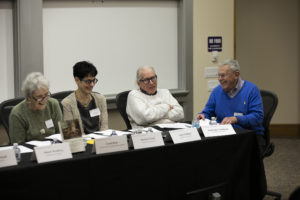
Barbara Fried: —and he would often wander into my office, sometimes two, three times a day, and place himself on the far side of the desk, come in with some witty observation about something that just happened, and then when he was halfway through it, he would look down at my desk from the other side and he would open up the book, the many books that would be on it, and he would start to read from them and would skim them for, like, two, three minutes, at the end of which he had the gist of all of them. Of course, I was slogging through them essentially like moving my lips as I was reading. And then he would discourse on them elegantly and connect them to a million other things he knew. The last point about this is because he was on the far side of the desk, he was reading upside-down. [audience laughter] So I just want to point out—I assume he doesn’t do this when he has control of the books himself. [audience laughter] So the mind boggles at how fast he must absorb things when he’s holding a book right-side up. [audience laughter]
So how does this relate to menschitude, Bob’s menschitude? Well, I think one of the most striking things—and somebody referred to this earlier about Bob’s erudition—is how lightly he wears it, and that is true of really how Bob wears all of his virtues. I sometimes think of Bob as surrounded by a force field that deflects every attempt at gratitude, praise, credit, and just tries to sink it into some black hole in the floor so he won’t have to acknowledge it and people maybe won’t even hear it. I assume, given that trait of Bob’s, that these two days are probably in some ways a living hell for him [audience laughter], and I just want to say that I think it’s really good for you, Bob, to be made to suffer like this every once in a while where you have no capacity to deflect what’s being said while it’s being said, and you just have to sit there and take it. [audience laughter]
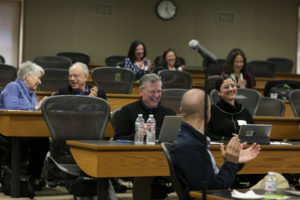
The second thing, which everybody’s touched on, has to do with Bob’s generosity of spirit. One of the common challenges that we all face when we serve on appointments committees or promotion committees or in a position to be evaluating work for one reason or another is that all outside evaluators have their own scale. We all have colleagues who start with, “This is a not-holy worthless piece of work,” and go down from there, and Bob is the opposite. Bob deploys what I think of as the olive scale, where you start with giant and you work up. And Bob, like all my other colleagues, is a really astute, discerning guy. There’s an ordinal ranking in there and there’s also a cardinal ranking, but you have to listen closely and get a lot of data points there to figure out what it is, because Bob’s initial impulse about people and about work is to see the very best in it and the very best in all of us. And how lucky we are, and how lucky I have been for thirty years to have a colleague and friend who looks at me, looks at all of us that way and sees the best in us and the best in our work. So, thank you, Bob. [audience applause]
Lawrence Friedman: Next, Carol Rose, who is professor emerita at not one but two schools, and who is also a great expert on property law and also is someone who, for some strange reason, left Stanford at one point. Okay? Take it away. [audience laughter]
Carol Rose: Lawrence, as I’ve said to other people, so many schools, so little time. [audience laughter] I did not get a specific assignment like mensch [unclear] for this panel. What I was told was that this was kind of the champagne panel before the rest of the serious work started, but, of course, we had some serious work just a few minutes ago. But for that reason, I won’t have a specific thing about mensch [unclear], so forth, just a few things that I would like to say about Bob, who I’ve known for a long time.
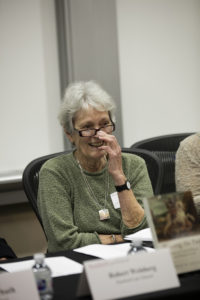
On the last panel, everyone was asked to say where they had first seen Bob, and I think I’m pretty sure our initial meeting was in 1977 when I was just finishing law school at the University of Chicago, and I went up to Madison, Wisconsin, to see my law school buddy, then teaching at Wisconsin, Martha Fineman, and I’m pretty sure Bob came over and told a lot of jokes and did the usual Bob Gordon thing there.
I actually really got to know Bob a good deal later when we were both at—well, when Bob was in his Babylonian captivity at Yale, and I, too, was at Yale, and that was when I realized that what everyone has been saying is true; that is, that Bob has read everything. He even had read some things of mine at a time when I was writing about streets and roads and water mills and harbors. Actually, there’s another point, Lawrence. Bob, I realize, had read from start to finish Willard Hurst’s book on logging and the logging industry. [audience laughter] Well, this is the book that you, Lawrence, described as Willard’s—what was it?
Lawrence Friedman: Lumbering.
Barbara Fried: Lumbering book. [laughter]
Lawrence Friedman: But I’ve always thought that when I say that, lightning will strike. [audience laughter]
Barbara Fried: Well, I read Willard’s lumbering book, too, and I liked it. I mean, that was the kind of thing that I enjoyed. Bob said something about me, and he actually just reminded of this a couple minutes ago. He said something I thought was quite memorable. He said that I brought a kind of a Ninotchka character to legal studies. “Take me to your sewage treatment plant.” [audience laughter]
But he also said something else about himself that he may have said to a number of other people, but I thought it was quite memorable. He said one time that he was the kind of crit that you could take home to meet your family. [audience laughter] And when I was reading this book, I was thinking about that remark, and I was thinking, okay, what kind of a crit can you take home to meet the family?
Well, and then I saw several things in this book that showed me what kind of a crit you can take home to meet the family. One of them is you can turn a nifty phrase. Several people have talked about this. You can say, as Bob did of Owen Fiss’ book on the Fuller Court, that it was a Baryshnikov piece of work. It was a Baryshnikov of a book, live, muscular, and elegant, with moments of acrobatic virtuosity. [audience laughter] But it was the Baryshnikov. I got that. Or you could save yourself—again, in one of the essays that’s in this book. This is the very famous article on critical legal histories, but Bob said, well, it was a kind of a compilation, and he was a sort of—he was writing a kind of a seed catalog of legal histories. Well, I thought that was rather too modest, but then the family might like that. So that’s another thing.
So what else, aside from these nifty phrases? I was very interested to read Bob’s reviews of the work of mentors and senior scholars, people that he knew and whose work he appreciated. His reviews of those things had a quality I think the family would also like, and it’s something that, Lawrence, your remarks suggested and that other people’s have, too, very laudatory, but also critical in a way that was very clear-eyed, but very gentle.
So of Horwitz, Bob pointed out how Horwitz’s historical sensibilities really tended to clutter up the grand theme of legal transformation, and I had the feeling on reading that again that Bob’s heart was with the clutter and not so much with the grand theory. And of Willard Hurst and of Owen Fiss both, he noted that there were overall themes of an expansive economic and political development, but that those themes downplayed some very real costs in the form of suppression of labor, suppression of oppositional speech, and of nonconforming social and political views. But once again, it was all very gentle, something that I think the family would be able to accept even from a crit.
I did have one question, and really I had more than the one question. I have a lot of questions, but one big question about this terrific compilation of Bob’s work on legal history and historians, and that’s its name. I had that question about the article with that name too. Why is this called Taming the Past? What is that picture on the cover of Saint George with the dragon? Now, I have read a lot of Bob’s articles and essays over the years, but this is the first time I sat down and read through a whole bunch of them at once, and the overwhelming impression that I got from reading all of those things at once was that he doesn’t really think the past can be tamed so easily, if at all. So I think that might really be what it means to be the kind of crit you can take home to meet the family; that is, he gives you this picture of Saint George, but you have to pay attention to realize he’s really rooting for the dragon. [audience applause]
Lawrence Friedman: Thank you, Carol. And remember what became of Ninotchka after the sewage plant.
Carol Rose: Yeah, I know.
Lawrence Friedman: She had a wild love affair, but all right.
The next speaker is Robert Weisberg, my colleague, head of the Criminal Justice Institute here and distinguished scholar and colleague and friend of Bob Gordon. And neighbor.
Robert Weisberg: Well, neighbor recently at home. But let me start by saying that Professor Fried stepped on one of my points. We enjoyed a Bob sandwich, because I had the office on the opposite side, and it was before Barbara got here, so I was Bob’s roommate, as it were, from the very start of his career here at Stanford. Now, Barbara, I think, is a little too high-minded in her description of the way Bob would walk in and start reading books and opining on them. Yes, he did that, but he took all knowledge to be his province then, as he still does now, and knowledge knows no hierarchy, so he’d walk into my office, and whether a particular piece of paper was facing me or facing him, it didn’t matter, he’d start reading it, and I realized he was reading the phone book, the marketing list, and all that. He wasn’t opining; he was spacing out. I’d have to sort of slap him, “Get going.” [audience laughter]
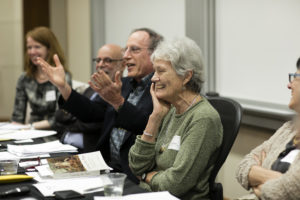
Now, this had an interesting—although he won’t even remember this, though that’s the key characteristic, of course—tragic possibility. Eight years later, because we had a major earthquake here in California, you recall, I was away from the law school. It was 5:00 in the afternoon. I don’t know where Tom and Barbara were, but I did go back to the law school to check on everything, but particularly on Professor Gordon, because I happened to remember that Bob would sit at his desk in that corner room, and the bookshelves were aligned such that, given the way the quake felt, well, terrible things could happen. Number one, he could have been killed. Number two—maybe this is a mitigating factor—he probably wouldn’t have noticed. [audience laughter] It took me a while to find out whether he was there, because the books had to be separated and all that.
Now, I want to say that when I was a junior faculty member when Bob was recruited here, I initially strongly opposed the appointment on grounds that could be call nominal, literally. When I was six years old, I was in a children’s ward in the Bronx to have a tonsillectomy in a room with six Bobs [unclear], and I realized that he was going to be the sixth Bob–quiz prize, for anybody who can remember all the others–and we even had a Roberta then, but I overcame that as I got to know him.
Now, I myself am extremely absentminded, but I never call myself an absentminded professor because it’s such a self-congratulatory term. It’s what you might call the opposite of damning with feigned praise. It’s praising with feigned damn. [audience laughter] Bob is the real deal on all scores, and I recall during his visiting year that year, he was renting a house from our late colleague John Kaplan. So Bob and I were having lunch around Tresidder [Memorial Union building—ed] or something, and somebody made reference to a garden hose. This would have been about 1:00 in the afternoon. And Bob had been chatting about this or that, something academic, and then he said, “Garden hose. Yes, garden hose. Interesting thing, a gard—oh, my god,” and he ran away. [audience laughter] I assumed the damage was alleviated in some way.
Now, I also recall the faculty meeting at which we voted a permanent appointment for Bob, and I was, at that point, happy to support it, despite the names, in part because I thought it would give Lawrence someone to talk to when he wanted to whine about how much better things had been in Madison, speaking of the diaspora. [audience laughter] Lawrence may not remember this, but he gave particularly eloquent remarks about the appointment, and the key document in front of us at the time was Bob’s great paper, “Historicism in Legal Scholarship,” which I still think is one of the five greatest articles I’ve read in my life. What I found most striking is Lawrence’s performance in his praise of it, because this is Lawrence. This is from the Wisconsin, Friedman, Macaulay school of on-the-ground social jurisprudence, and he’s talking about a paper which is historiography. It’s meta-historiography, and he just like—he was surrendering to its brilliance, as we all did. [audience laughter]
A couple of other things. First, I got to know, at least briefly, Bob’s father, Lincoln Gordon, and I learned to appreciate something I didn’t have much academic knowledge of, and that is the heroic era of statesperson that Lincoln Gordon had been part of during and after the New Deal, and it gave me an insight into the personal familial interest that Bob had in the model of lawyer, statesperson, cultural hero that we’ve been speaking about a lot.
And it struck me, as I got to know Bob better, that one reason his scholarship on that subject and others has been so great is that he, at least indirectly, was of that world, and yet had, of course, great critical perspective on it, and it hit me—I was just looking through some recent Gordon stuff, including a very recent paper, a book review he did of a book by Ben Heineman and David Wilkins about the revival of that model of lawyer, and it’s an interesting update, if you will, on the Gordon view of things. What I found fascinating about the paper is that he tries, and succeeds, in being fairly critical about the claims being made there about the revival, but it still shows—or I shouldn’t say still shows—it shows something which has never gone away, and that while Bob is a kind of critical and ironic anthropologist of law and the legal profession, he’s an idealist about it, and the idealism has never gone away, and it’s really, I think, infused his teaching and his colleagueship.
Just a couple of other things. I apparently committed a disciplinary violation, and Dean Brest made me associate dean for a while, and so I was supposed to do the curriculum and all that, and I recall there was some slots to fill, and I realized, well, wait a second, Gordon told me he wanted to do corporations, he wanted to do evidence, and for a while I said, “My god. The ideas I have. Gordon on tax. Gordon on bankruptcy.” We could have done almost anything. [audience laughter] But the point is that I think Bob loved doing all these things in part because he had the best kind of childlike fascination, absorption in law, and also, on the other side, that kind of thing we’d wink at each other about saying, “My god, they pay us to do this. We get to do almost anything we want.” In any event, I think he’s obviously enriched all our lives in the profession in every way.
I want to end on a note that doesn’t sound too high-minded, again getting back to the fact that I’m absentminded too. Neither of us, but I think Bob in particular, neither of us will ever be subject to the charge of being a little OCD about deadlines, okay. [audience laughter] But the friendship he and I developed enabled me to deploy a certain complicity, if you will. So it was during Bob’s interregnum before his restoration back at Stanford when he was at Yale, I had agreed—I believe it was Jack Balkin—to do a chapter in this book called Law’s Canons, and various people in various fields were supposed to write. It was kind of a fun, you know, a think piece, top ten cases in our field or top ten pieces of scholarship in our field, and I let the deadline slip to some extent, and there was a way of my getting it in not too late. I asked for a few more weeks, and I knew I could do it in the last few weeks. There’s only one problem. I had forgotten whether I had been asked to do the one on substantive criminal law or criminal procedure. I could ask Jack for more time, but I couldn’t, if I had any hope of saving my reputation, ask him what I was assigned to. [audience laughter] I was in a quandary. I didn’t know what to do, so I simply was trying—who would be the ideal person who would have access to the information and who would be psychologically constitutively able incapable of mocking me for it? [audience laughter]
Well, it all worked out fine. Gordon went up to Balkin’s office and said, “Hey, I heard indirectly that Weisberg is writing a chapter for you. Which one is he doing?” [audience laughter] It all worked out very well. Thank you, Robert, for that and everything else. [audience applause]
William Forbath: So I also didn’t get the memo about which of the three words in the panel title I was to talk about, and so I’m going to try to smoosh together something about Bob as mensch and Bob as theoretician. So, starting with the first, if you’re an untidy character like me, your email box probably has many years’ worth of mail in it, and one great advantage of this is it means I have an archive which documents just what a mensch Bob is, because in the box is a bundle of emails from Robert W. Gordon about projects, articles, even journalistic screeds that even my spouse doesn’t read, which Bob spotted and found time to read and write lovely, shrewd, wry notes about, and I wager this is true about many, many people in this room. Indeed, it’s probably true for scores of people who’ve entered the ranks of legal historians during Bob’s long reign as our menshlich. I think it’s menshlich or menschlichkeit. It’s not “menshitude.” [audience laughter] But that’s okay. Metahistorian-in-chief.
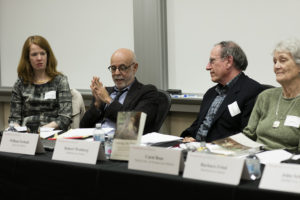
So let me say a public thank-you on all our behalfs for that, and let me turn to the second word, theoretician, although you’ll see we’re not leaving the mensch behind. I called Bob a metahistorian, and I think Bob, too, did—or Bob one did too. [audience laughter] Metahistory captures what most of the essays in Taming the Past are about, and I want to say something very brief, even telegraphic, about the metahistory in relation to Bob’s work as a workaday historian and as a scholar of professional ethics.
It seems to me two big things unify the metahistory and the rest. One is that, in one way or another, all three concern the legal elite, the leaders of bar and bench, the lawyer statesmen, the corporate bar, the state-builders, the big-firm lawyers, the liberal legal intelligentsia, the [recording unclear-ed.].
And second, read together, they show that for all his wryness, irony, and modesty, Bob is a moralist. He’s a radical critic of the legal elite and all its works, but he’s what Michael Walzer calls a situated or loyal critic, loyal to and situated within what Bob unabashedly calls—and we’ve heard it again and again—the great tradition of republican lawyering. Most openly in his writings on professional ethics, but not far from the surface in his historical accounts, Bob chronicles and laments the decline of the public-regarding, justice-seeking side of this elite tradition. He is the always skeptical but ever hopeful keeper of the lost republican soul of the corporate bar, and, of course, part of what makes Bob’s recurring narratives of decline so wry is that Bob is so full of metahistorical awareness of the genre he’s writing in and all its conventions and limitations.
But if Bob is a moralist, what’s the moral? The moral is agency, moral agency, and responsibility. It’s the lawyer’s active part in constructing the social world, for good or ill, which she cannot fob off on the system, the code, her client, or anyone else. That, it seems to me, is the thrust of Bob’s recent treatments of the ethical world of the big-firm practitioner, but it’s also the outlook and insight animating his early historical essays on the leading corporate attorneys and liberal legal reformers of Gilded Age New York and their divided souls as they strove, in Bob’s biting words, to address the conditions of their own degradation.
1984 was the year Bob published the gem of these essays, and it was also the year he published the canonical “Critical Legal Histories,” the centerpiece of Taming the Past. “Critical Legal Histories,” which I’ll call CLH, of course, has become a premier guide and theoretical toolkit for doing legal history, and as such, it’s received some penetrating critiques. These have focused on Bob’s key moves in that essay underscoring the indeterminacy and contingency of legal arrangements and, at the same time, law’s—hats off to Jed [Shugerman]—constitutive part in constructing the social world.
The gist of the critiques, I think, is roughly this: that like his fierce 1980s comrade-in-arms, Duncan Kennedy, Bob seems to conflate the indeterminacy of legal discourse with historical indeterminacy and the contingency of legal developments. But because Bob’s great essay is so much more limpid and accessible, and because, unlike Duncan, he uses social and economic as well as internal doctrinal history to drive the point home, the difficulty becomes clearer. So Bob seems to put his vast knowledge of comparative history and sociology to work in order to clinch the following point. Because capitalist development around the globe has given rise to a great variety of institutional arrangements, many of them far more equitable and egalitarian than our own, it follows that the particular form which, say, U.S labor law or U.S. insurance systems or the general distribution of risks and rewards in industrial life in American has taken, the general form it’s taken or any of these other things has taken was a matter of historical contingency open to many alternate pathways of development. Legal decision-makers, in particular, could have pushed these alternatives. Some did, but, as everyone here probably remembers, you know, most were mired in the false necessity of the particular arrangements around them that they took for granted or knew best.
The upshot of this highly influential history-writing lesson, so Bob’s critics say, has been an orgy of contingency and alternative paths not taken in the work of the next two generations of legal historians, some of whom are here in this room, one of whom is sitting before you, often blithely indifference to whether some given development really was a contingent one, whether some alternative pathway really had a snowball’s chance in hell, whether what happened in this or that corner of the legal arena might have been not so contingent at all, but more or less over-determined. That, I take it, is at least one important critique of Bob and the school of historiography he helped shape.
But if I’m right, then this is something of a bum rap. Bob wrote CLH as a guide, all right, but not a guide to history-writing. In the essay itself, what he’s offering, he says, is a little guidebook, again in the sort of seed catalog, you know, passage, a little guidebook to critical legal studies, and more precisely, a guidebook for liberal lawyers who might be curious to know what the fuss over CLH is about. And there’s the rub, right? CLH obviously has a call for a certain kind of legal history writing, but it is the work of a radical moral critic, but a loyal and situated simpatico, you-can-take-him-home critic, accessible, not a Duncan Kennedy or a Mort Horwitz, but a simpatico critic gently using history to bring a message to the liberals, right, about the radical gospel of CLH, and that’s why for all its quiet erudition and its limpid style, it’s always seemed to me that CLH crackles with moral energy. It uses history to assail what Bob sees as the moral as well as the theoretical failings of functionalism and determinism, and when Bob goes on in one-sided fashion, as surely he does, about the contingency of legal arrangements and the open-ended paths of legal development, he’s underscoring the moral agency and responsibility of the lawyer and the law scholar and the awesome world of alternate social possibilities she ought to ponder. So if Bob helped bring about an orgy of overblown contingency in the legal historical imagination, he’s not entirely to blame. He was doing a different kind of work, missionary work, if you will.
If I had world enough and time, I’d demonstrate my point in another way. I’d show you that Bob’s own historical [recording unclear-ed], his own narratives of long-term legal historical developments really don’t follow the guidebook. When you look under the hood at the theoretical engine in work like The Cambridge History of Law in America chapter on the sort of longue durée of the legal profession, when you look under the hood, you don’t find a lot of contingency, right, or open-ended paths of development. There are not a lot of other states they might have built, right? You find a lot of structural determinations, in fact. But that’s for another time.
For now, I want to salute the fine, fierce, gentle, earnest, hilarious moralist who inhabits all of Bob’s work and shines through in his countless everyday acts of solidarity and support. [audience applause]
Lawrence Friedman: Alison LaCroix, University of Chicago, Robert Newton Reid Professor of Law and distinguished legal historian, now it’s your turn.
Alison LaCroix: Thank you. I like the “comparing-our-various-remits” part of this because it’s very interesting. We were all assigned to give a toast, maybe because we’re also right before the cocktail hour, so that seems right. I also want to add a theme to the list of “wordsmith, theoretician, mensch,” which is the theme of Bob as a teacher.
I started at Yale Law School in the fall of 1996, thinking I was choosing one path very dramatically and abandoning another. I’d been a history major in college, and I thought, “I’m turning my back on history, and now I’m picking law,” having no idea what law meant, but knowing that I liked history. Probably many of us maybe have been in that situation. And on the first day of law school, I thought, “I’ve made a terrible mistake.” [audience laughter] This is the first time I’ve ever actually admitted this, other than to my longtime law school friend and roommate.
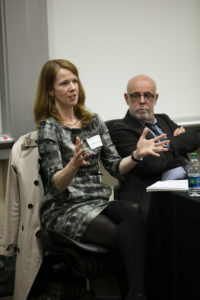
There were occasional glimpses of history in the first-year curriculum. There were all these railroad cases, and I was thinking, “Why all the flax? And what about the Northwest Ordinance? Okay, no, it’s not about those things. Fine. But, boy, that’s weird, all the railroad cases.” And Chief Justice Shaw and Herman Melville – that was a great day in torts, but very distracting, and the reference to Robert Cover’s work on antebellum antislavery judges, and again, that wasn’t exactly the point, but I thought, “Oh, wow, that’s really cool.”
But mostly it was all law and no history, so I didn’t know about legal history until the spring of my second year, when I took a seminar. This is a seminal seminar for many people in this room: the seminar, co-taught by Reva Siegel and Bob Gordon, with the title “Topics in Nineteenth Century American Legal History.” Capacious, vague, fascinating.
Bob and Reva’s seminar – or, as those of us who were part of the hearty band called it, “Siegel-Gordon” (it was like a one-word moniker) convinced me that I hadn’t made a mistake, which was good, because again, that was spring of second year. But I think I was pretty confident by that point. [audience laughter] The seminar was this incredible experience: generative, stimulating, a grounding in classic works of legal historiography. And it was also a cohort-building moment: people sitting around this hollow square of tables in the room, just working through and thinking about things. And everybody was also working on their own papers at the time. It was really a foundational experience for a lot of us in that room, and beyond.
When I started a Ph.D. in history after law school and after two years in practice, Bob’s work become even more salient and motivating, but in different ways. I discovered that there were still some non-lawyer historians who viewed lawyers with suspicion. It was funny: I was never more a lawyer than the first day of history graduate school. “Oh, you’re the lawyer,” someone said. I thought, “No, I’m here – I’m not ‘the lawyer.’ Because I think for some people, there was a sense that if you’re a lawyer, you write briefs. You might not even get what history is supposed to be. You’re using history to do something else. But Bob’s work gave me a vocabulary and a grounding in texts to talk about with colleagues, classmates, and professors. Especially important, I found, were the harmonies between his work and intellectual history and the history of ideas as deployed in conflict and in argument – to use Dirk Hartog’s phrase, “arenas of conflict,” not brains in a jar. It was powerful to think of legal ideas as emerging out of debate, conflict, sometimes in courts and sometimes in other domains.
When I began teaching in a law school in 2006, I encountered yet another side of Bob’s great generosity, as a teacher of teachers. I went to ASLH in Baltimore in 2006. My memory of the conference is so vivid. I was preparing to teach a course that I had grandly named “The History of American Legal Thought.” My plan was to bring together elements of Mort Horwitz’s American Legal History class, which I’d audited in graduate school, and the Bob-and-Reva seminar. I thought, “If I can pull it off, it’ll be great, but I should figure out what this course is going to be about, and I should really figure out what we should read.”
So at ASLH in Baltimore in 2006, I was sitting next to John Witt at dinner, and we had a conversation. (By the way, just the thought of my students having this conversation would make me so happy as a teacher.) I was agonizing about my upcoming class and wondering, “What are we going to read? What would be good to read?”
And John said (I think of him uttering this in a whisper, but I’m sure it wasn’t. I mean, it was ASLH, which is a pretty sympathetic group). John said, “Bob has this article about the subversive uses of legal history, and it’s really great, and law students really get into it.”
And I said, “Oh, ‘Critical Legal Histories’?”
“No, before,” John said. “It’s ‘Historicism in Legal Scholarship,’ the 1981 Yale piece.”
So I went home. I read it. I thought, “This is tremendous.” I assigned it, and it sparked an energetic discussion, and the students really got into it. “Legal history was subversive? Tell us more.” [audience laughter] You could feel them leaning forward.
The lines of the transmission of knowledge here are just so wonderful. Also wonderful is the fact that the article, like so much of Bob’s work, gave a theoretical framework that law students could use – even law students who had not studied history, weren’t sure what legal history was, or thought that it was confined to the history of particular doctrines. Bob’s work gave me a way to say to my students, “Look, there is a way to think of law in terms of interdisciplinary inquiry: as a social science, as a humanities approach, and as theory.”
Reading and rereading Bob’s work in preparation for today really has been a tonic. It’s like an infusion of scholarly zeal and courage. The dragon image is exactly right. When I first encountered Bob’s work in law school, it was rich and it was important and it was difficult. I remember reading “Critical Legal Histories,” and it took me a very long time to read it. I thought, “This is really important and it’s really hard, and I can’t go out on Thursday night, because I am reading ‘Critical Legal Histories.’ I need to understand what it means.”
Now Bob’s work is still rich, it’s still important, it’s still difficult, but in a different way – as something to grapple with and embody and try to enact. It’s a call to arms. How do we think about theory in legal history? What does that mean? What is it we’re doing? What kinds of claims can we make? We’re rooted in the particular because we’re historians, but what theoretical claims can we make about knowledge, about the interactions between the internal and the external? I don’t mean that dreaded question that we sometimes get from the non-historian colleague, of course: “Are you saying that absent this one thing you’ve just spent a long time writing about, none of other important things would have happened?” No, that’s not what I’m saying. We don’t have to go all the way to the grand causal claims. But we should think about them.
How exciting it is to work in a field in which there are dragons. Beware a dragon-less field, because that means there are low stakes or no stakes. So if I were toasting, I would say: a toast to Bob and to the dragons, because we need them. They’re menacing, but they are friendly. Thank you. [audience applause]
Lawrence Friedman: The last, but not least, happy birthday, John. Go ahead.
John Schlegel: I got an order: Talk about Bob in Buffalo where I go back a long, long way. In 1972, I was interviewing for a job at Buffalo in the big room that people gathered in for such things there. The library was contiguous. One day, this person popped out, said, “This is a good place to be. Come,” went back in the shelves. I had no idea who it was. [audience laughter] I didn’t know it was Bob.
My first Buffalo Bob had the last name Smith, and he was on The Howdy Doody Show. Clearly when asked to speak about Bob in Buffalo, some other person was intended. Though Buffalo in the mid-seventies was an exciting place for any new teacher and scholar to begin, when I think about this other Bob in Buffalo, my first thoughts, and I suppose, in some sense, my most important memories, are social: Emily and Kate, his daughters, who had a wonderfully bedraggled doll named for my daughter, Elizabeth Schlegel. The family dog, Mr. Nimos —“Nimos” means “dog” in Ojibwe—as gentle a soul as one might want, who walked the Gordon neighborhood as if he owned it and loved to play Tug of War with big sticks. Thanksgiving dinner with turkey cooked by Unc, Martha’s surrogate father, and many, many wonderful parties where too much alcohol was consumed.

For me, academic life in Buffalo pretty much revolved around a strange creation called Section 3—we even had buttons—in which four of us taught together in the fall semester: Bob, who taught contracts; Al Katz, who taught crimes; Jan Lindgren, who taught torts; and I, who taught civil procedure. Section 3 was known locally as the Experimental Section, though about the only real experiments carried on were acknowledging in class that we taught together, met together weekly on Thursday evenings at my house where we talked about what had happened in our various classes during the week, and instituted a “Bitch Day,” a single class about halfway through the semester devoted to inviting, listening to, and answering student complaints about being in law school in general and our courses in particular. [audience laughter]
Jan and I were the new kids on the block. Bob had come the year before, and Al, several years earlier. He was the old man, and looked it. He had tenure and a fiercely determined analytical mind. Bob was clearly the best teacher among us and the person who best understood what it was to be an academic, I suppose because it was a job that ran in the family. On the other hand, he was the only one of us who wrote not just on the blackboard, but on the checkerboard of brickwork that lined the sidewalls of our classroom.
People sometimes ask what I learned from Bob in those years. “Learned from” may not be the right phrase. Watching and listening to Bob, I figured out that I had no future as an extemporaneous speaker. That early in his career, he was already a master of a well-turned oral phrase, something that I can only do in writing. I also figured out that I could in no way match his gentle, sometimes elfin humor, or in his graciousness when asking or answering questions in class or faculty seminar. Indeed, my attempt to do something similar in a class brought a student during one Bitch Day to suggest that when I responded to a student’s answer to a question of mine with the word “perhaps,” the word came through loud and clear as meaning, “No fucking way, you blithering idiot.” [audience laughter]
Bob’s actual attempts to teach me something, for example, when he suggested that it would be dangerous for me to read Fernand Braudel, and when he insisted that I should write less dense prose, in his words, “Remember, Schlegel, the reader is a lazy slob,” were largely failures. [audience laughter]
He, who when asked by the dean how to get me to write more, responded that the dean should not try, because I was as stubborn as an old mule, should have known that I would immediately go to the library and get a copy of The Mediterranean and read every last word, as was the case with Capitalism and Civilization at a later point in time when I was incapacitated from writing with carpal tunnel syndrome. My prose is still too dense, as dense as English wedding cake or that Italian Christmas convection, panforte, though perhaps it now contains fewer abstract nouns, and I’m told is more stylish, but surely no one is as stylish as Bob.
But what Bob did teach me, mostly by example, comes from my earlier reference to his asking questions in seminar, and this is, of course, why Buffalo was a wonderful place. When I came to Buffalo, there was no equivalent to the now ubiquitous faculty seminar of today, but in some ways, we had it better. Marc Galanter had money from some unnamed grantor essentially to bring in all of his friends from the then-forming Law and Society crowd for a regular Friday seminar that would discuss articles or books when invited guests could not be secured. This was the intellectual center of the law school, and with the Section 3 weekly meetings, created about the best introduction to being a law professor as one could possibly have.
Bob was a regular at seminar. I slowly became one. And Bob was already a genius asking a pointed, in retrospect often hostile question, in such a way that the speaker was not offended by being forced to attend to problems buried in the argument made. So what you talked about, ladies and gentlemen, was there at the beginning. It was a model that the straight-from-the-shoulder midwesterner in me could not possibly emulate, but it did teach me to keep my mouth shut far more often than otherwise would have been the case. That learning has been very valuable indeed. [audience applause]

